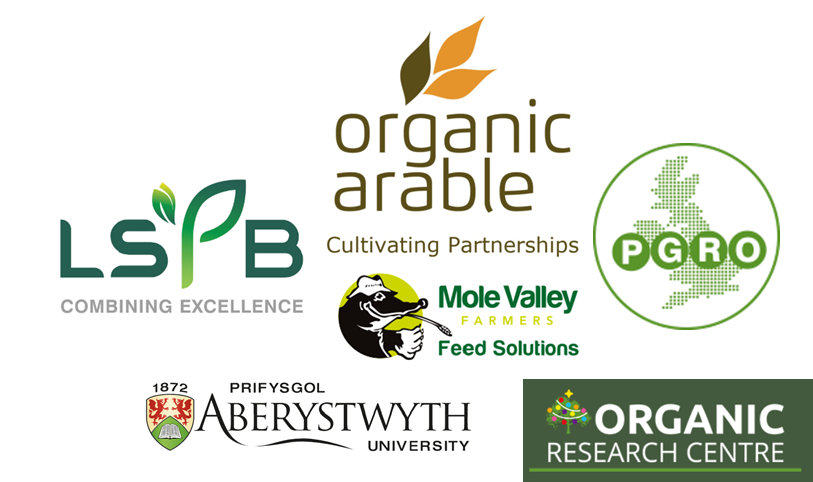Hi Everyone, good morning from a snowy Oxfordshire. As I hope you're all aware we will be running an event next year on 1st February centred around organic bean cultivation and the supply chain, with this event also forming something of a kick-off meeting for the living lab initiative we'll be undertaking through the LiveSeeding project. The event is starting to take shape and I thought it would be good to tell you what we have on the agenda. We have reached out to several bean stakeholders and have pulled together a complete supply chain from breeders to processors to work collectively together to try to improve and increase organic field bean cultivation.
We are in touch with LSPB, a UK-based subsidiary of Norddeutsche Pflanzenzucht Hans-Georg Lembke KG (NPZ), a German plant breeding company. The company have so far cornered the market in low vicine/convicine (LVC) cultivars, seemingly restricted to spring varieties, which are favoured by the mills and which Mole Valley, the feed mill we have engaged in the initiative, have highlighted as an important trait for them. The main LVC variety LSPB have bred is Victus, but others that have recently been introduced include Tiffany, Bolivia and Allison. LVC beans can help improve the feeding efficiency and overall performance of livestock, particulalry monogastrics although ruminants can also benefit. Breeding these anti-nutritional compounds out of field beans represents a good opportunity for explanding their use for both livestock but also human consumption. LSPB also breed spring varieites Lynx (available through us as organic seed), Yukon and Vertigo and whilst LSPB dominate the spring cultivar list, it is Senova who have had greater success with winter bean cultivars, having six of the eight on the most recent Descriptive List (DL), inclusing Vespa and Tundra. To this end we have approached IBERS (Aberystwyth) who do the breeding for Senova, and hope to have representative of their bean breeding programme at the event, with their own interest in working more closely with the supply chain. Importantly we also have PGRO involved, who run the trials underpinning the DL and who, as a levy body, conduct a lot of research and help promote and support the pulse sector in the UK as the centre of excellence for peas and beans. As previously mentioned, Mole Valley will engage, as a farmer owned co-operative specialising in ruminant nutrition, and investing in research, they are keen to be involved and most excitingly see the potential to double the amount of organic beans they process through their mills.

We know there are environmental and economic benefits to growing beans and increasing cultivation and inclusion in organic rotations should help support improved soil fertility and health, but so far organic bean cultivation has been limited, which is in large part due to the challenges of growing them, including poor weed competitivness, disease susceptibility and the variability of yields. The research we hope to conduct will build on the LiveWheat approach and start with a small culitvar evaluation network, hoping to engage those bean growers in testing the current available varieties of interest and hoping to understand not just their performance in the field but the journey along the supply chain too. As LiveWheat did for organic wheat, we hope to create a foundation of understanding of organic bean production, building evidence from the farms on cultivar performance and the environmental and management factors that affect this, as a first step to help foster innovation and improvement. We will aim to work directly with our members to run these trials, and will look at both spring and winter cultivars and where appropriate, try to include bi-cropping as one key management practice that several farmers are now using to overcome some of the trait deficiencies for reliable perfomance of organic bean crops. It may be that certain cultivars are better suited to this than others. It would also be interesting to consider using bean varietal mixtures in the hope the diversity of traits could help to improve the performance over the monoculture. We suspect there isn't much variability in the current varieties but we don't know for sure under organic husbandry on-farm, and determining this with evidence can help support decisions on not just variety selection by the farmer but also the suppply chain.
Below, the draft agenda for the day;
9:45 | Arrival | |
10:00 | Event Introduction and Market The purpose of the day and the agenda, context on the market and opportunities | Andrew Trump |
10.15 | View from the Mill - a Buyers perspective Processors requirements and the buyer’s perspective | Daniel McCreadie/Charlie Lowis - Mole Valley Farmers |
10:30 | Opportunities and Challenges An open discussion from all stakeholders sharing their perspectives | All – Led by Andrew Trump/Dominic Amos |
11:30 | PGRO R&D and future work plus Q&A Descriptive Lists, research and the pulse sector | Roger Vickers |
11.50 | Bean Breeding Traits of focus and challenges of breeding for these. Breeding for organic farming. | Michael Shuldman/Chris Guest - LSPB (TBC) Catherine Howarth/Robin Warren - IBERS (TBC) |
12:15 | Working Lunch and Bean Agronomy Technical guide to bean cultivation | Dominic Amos, All |
13:30 | Farm walk – Visit to a bean/wheat bi-crop Discussions in-field about the crop, growing beans, bi-cropping and data from the field | Phil Douthwaite, Dominic Amos |
15:00 | LiveSeeding – Living Lab Proposal and Trials Working together to foster innovation through research | Dominic Amos / Henny Lowth |
15:30 | Event close, summary and departure | Andrew Trump |
It would be fantastic to see as many of our bean growers as possible at the event next February and hopefully members who are keen to start growing and seize the opportunity the market and we hope our living lab will support.
